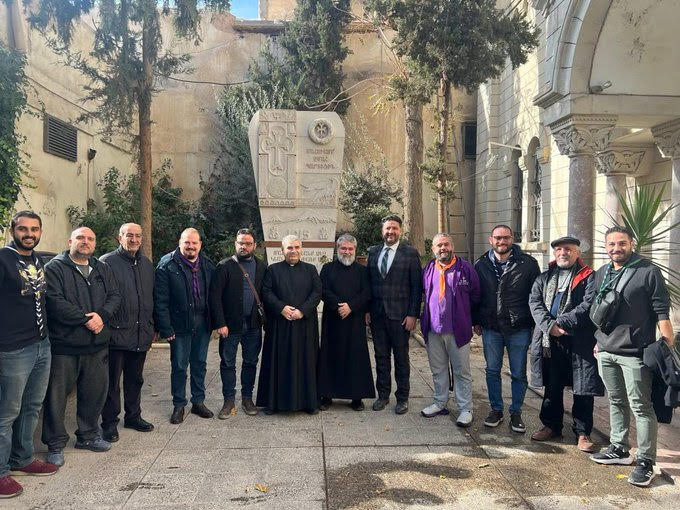Ahmad Baccora, a member of the political committee of the Syrian Opposition Coalition (SOC), held several meetings with religious, community, and diplomatic leaders, as well as officials from the regime’s government, to discuss ways to ensure the participation of all Syrians in fostering civil peace and enhancing social cohesion across Syria, particularly in Damascus.
Baccora met with church scouting teams in Damascus, coordinated by Archbishop George Asadourian of the Armenian Catholic Church in Damascus, Monsignor George Bahe, and attended by a team from the LACU organization.
The discussions focused on activating the role of local teams and community development committees, emphasizing the importance of the Christian community’s participation in rebuilding Syria. The dialogue highlighted preserving the roles, status, and rights of all Syrian components and addressing the gaps in the state’s structure by including all spectrums of Syrian society.
Participants stressed the importance of activating the role of church scouting teams, which are well-organized institutions with a long history of community service.
Baccora highlighted the sensitivity of the current phase, stating that the SOC is carefully and cautiously managing it to prevent any attempts to undermine the transitional process. He emphasized that victory represents the triumph of the Syrian revolution and that Syrians will not allow their achievements to be squandered. He added that the SOC is doing everything necessary to achieve the goals of establishing a democratic, civil state for all.
He underscored the need for a dignified, stable life and an atmosphere of peace after years of war, explaining that comprehensive national reconciliation involves including all components of Syrian society in rebuilding the nation. Achieving justice and holding perpetrators of crimes accountable are essential steps to rebuilding trust among Syrians.
Speaking to the Huna Lebanon website, Baccora described the project for change as a purely national endeavor that prioritizes Syria’s supreme interests over any individual or sectarian considerations. He stressed that all national components must contribute to building the new Syria and that the Syrian people will not allow any attempts to derail their aspirations for freedom.
Baccora pointed to post-liberation Aleppo as evidence that normal life can resume when the rights of all communities are safeguarded. He stated, “We are advocates of peace and reconstruction, not exclusion. All religious and ethnic components of Syrian society are integral to the national fabric and have played a role in the revolution, which they will continue to do in Syria’s future.”
He affirmed there are no signs of extremism in Syria today, as Syrians are moving towards building a free state based on democratic foundations. He noted that the people are already contemplating elections and choosing their representatives, reflecting their high level of awareness and their collective will for change.
Baccora declared, “The great Syrian people will not accept anything imposed upon them. The form of governance is the decision of the people alone, and no entity will be able to impose its vision by force. Syria, with its rich history and religious and ethnic diversity, considers this diversity a source of strength and cultural wealth.”
He emphasized that Syrians have overthrown one of the most oppressive regimes in history and will not allow the reemergence of a new tyranny or the squandering of their sacrifices. He concluded by noting that the Syrian people are closely monitoring the current phase with great awareness, understanding the importance of the period between the fall of the regime and the establishment of a new state.
(Source: SOC’s Media Department)












